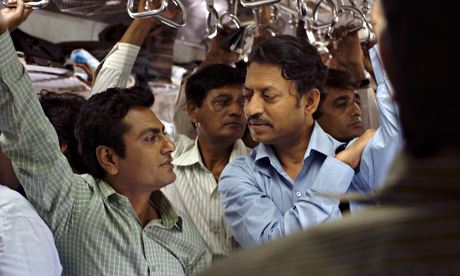
Blockbuster love stories in Indian cinema, as audiences well know, tend to come with a touch of melodrama; vivid, emotive musical romances about uncomplicated heroes and heroines moseying towards the happily ever after. That Ritesh Batra's quiet and melancholy debut film, The Lunchbox, has become a box-office phenomenon at home – with healthy returns abroad, where it's been making the rounds on the festival circuit – is as much a surprise to him as it is to critics. The New York Times considered it a Bombay anomaly, "a rare event when a quiet movie of unexpressed anguish and yearning emerges from this brash city", while Variety lauded it as "a feel-good movie that touches the heart while steering clear of expectation".
"I didn't expect the reaction it got in India and how much it resonated," says Batra, unassuming and softly spoken, as we breakfast in a gaudy central London hotel. "But it's a good sign that home audiences are changing – people want to see their stories on screen. My parents were worried for me when I showed it to them. My mum couldn't understand why I hadn't included any songs." Or, as it happens, much in the way of action or escapism. Instead, the film unspools two stories that accidentally tangle when a lunchbox delivery goes awry: Saajan Fernandes (Irrfan Khan), a widower on the eve of retirement from his 35-year job at an insurance company, and Ila (Nimrat Kaur), a young housewife trapped in a lonely prison of a marriage. Theirs isn't even really a romance; it's a collection of letters, a correspondence that begins when Ila's home-cooking – meant for her husband – ends up on Saajan's desk instead.
The initial idea was to make a film about the city's 5,000 or so lunchbox delivery men, the dabbawallahs. "I embedded myself with Bombay's dabbawallahs in 2007, with an idea of finding a personal story among them. It was interesting to see how much they knew about the people they deliver food for everyday." Often illiterate and without IT, Mumbai's dabbawallahs run arguably India's most efficient and trusted business. Every working day, for more than 125 years, Batra explains, they have transported hundreds of thousands of tiffin lunches back and forth from home kitchens and restaurants to office workers in the world's fourth most densely populated city. Harvard Business School commissioned a six-month study into the service in 2010 that worked out that only one in a million deliveries go awry. Batra's film hones in on that one.
Batra, 34, originally moved to the US to study economics at the Ivy league Drake University, but ended up working as a consultant for Deloitte. "I quit after a couple of years when I realised I wanted to make movies, and that was it." He got into New York's Tisch school of arts, but dropped out after a year and a half, feeling bogged down by theory. His short film Cafe Regular, Cairo picked up some buzz in 2012, but he was pragmatic about his options as a film-maker in New York. "To stand out, I knew I needed to go back to India to tell original stories," he says.
For all his quiet modesty – and he is unfailingly polite and measured as as he fastiduously works his way through his egg-white omelette – Batra remains peeved, for one, that the Film Federation of India (FFA) chose not to select The Lunchbox as its entry for the Oscars. The Good Road, which was submitted instead, failed to get nominated. "I wasn't the only one disappointed; Irrfan was shocked and so was Karan [Johar, Bollywood super-producer]." He clams up, not keen to reignite what became a vindictive public spat between him and the FFA, one which ended in him apologising to the body last year.
"It's a cliche, but in the end it's the audiences that you want. Last year, I was driving in Mumbai when this review show came on the radio and they were talking about my film. I had to stop the car. People were phoning in with these stories – 'My mother watched it three times when she was dying of cancer, because it made her happy' – or about how the film tapped into women's issues."
Was he conscious of the film's feminist resonances when making it? "Obviously I'm not a woman, but I am always self-conscious. I have a baby girl, who was born during the edit of the film, and I want things to be different. Because of the environment in India right now, [sexual violence] is being spoken about, perhaps, for the first time. I think the movie has found its way into the conversation."

